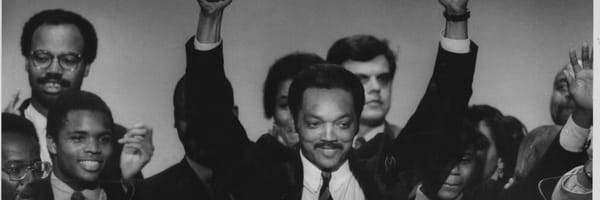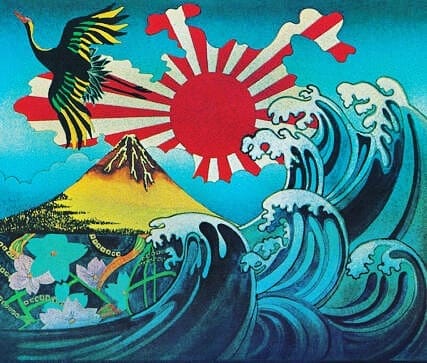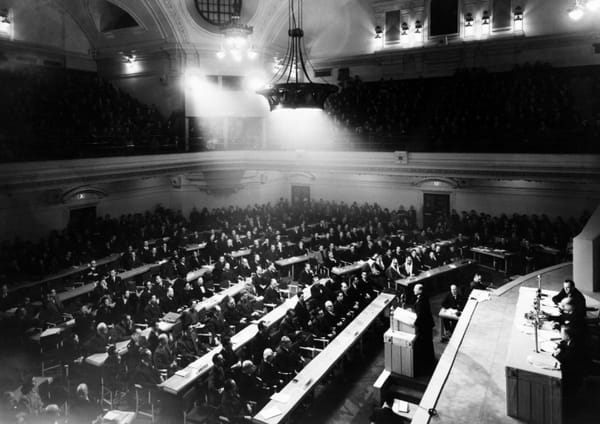The 80th Anniversary of the Atomic Bombing and the Fire that Still Burns
Vincent Intondi's powerful personal account of his transformative journey to Hiroshima and the moment that changed his life forever. A stirring call to action for nuclear abolition.
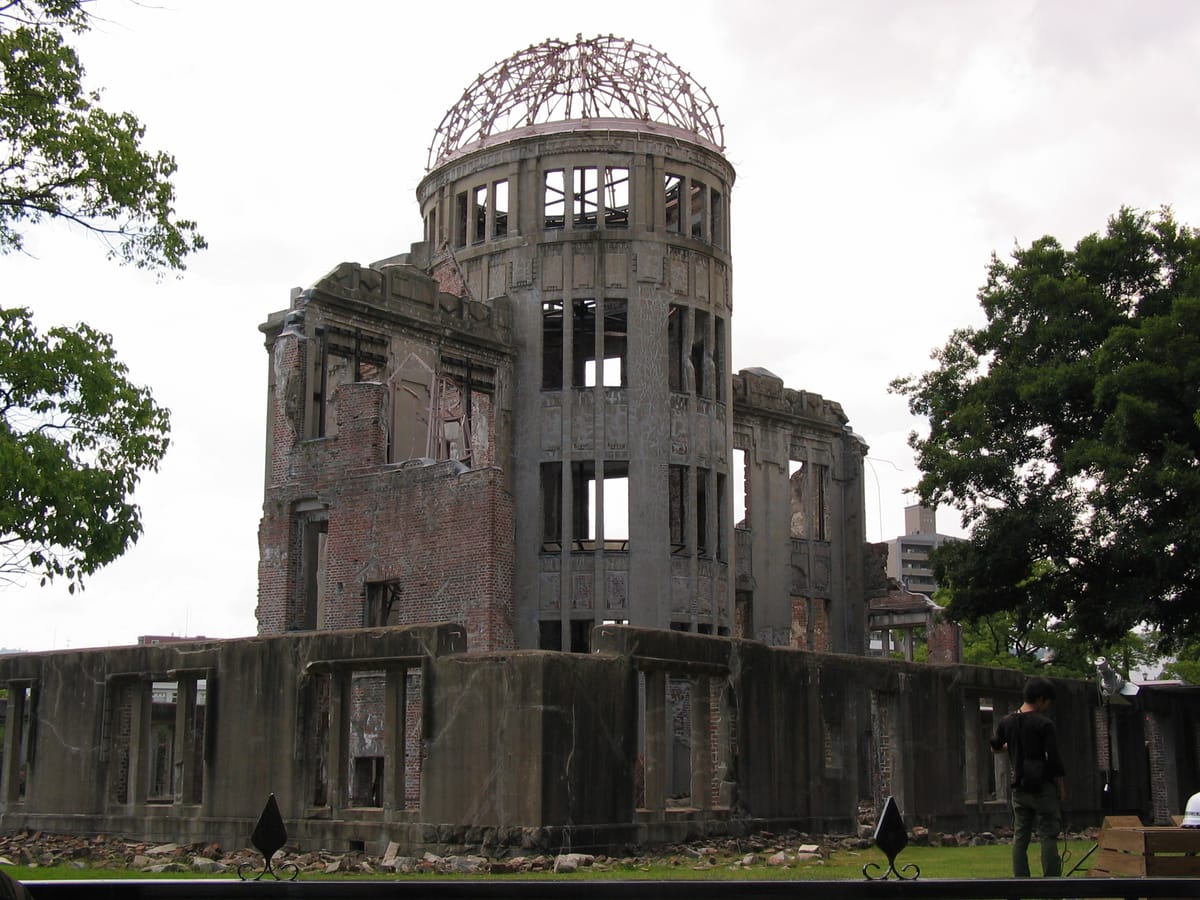
I could feel the anxiety coursing through me. I was sweating and getting hotter by the minute. Of course, that could have also been the humidity and heat that is August in Japan. All of the preparation I had done up this point had gone completely out of the window. All of the books I had read, classes I took, lectures I sat through, documentaries I watched simply did not prepare me for what was about to happen.
Some live with no schedule, no routine. They are spontaneous. There is no plan. They are carefree. I envy those people because I am definitely not one of them. I am as routine as they come. I have lists for my lists. I always have a planner on hand. I stress about everything. So just the idea of traveling to Japan was not something that I had planned for or put on the vision board (if I had one). But life, fate, the gods, whatever you want to call it had a different idea and in 2005 I made my first trip to Hiroshima.
As the train pulled up, something in me immediately changed. I stepped off the platform and I felt as though I had been transported to a different time. I was in the very place, standing on the actual ground that I had seen in photos, on film, and read about in numerous books. For some reason, I expected it to look like 1945. I envisioned getting off the train and seeing the same city I had seen in so many black and white photos. I was shocked to be in a vibrant, colorful, bustling city filled with people just carrying on through their day. I had trouble comprehending the green grass, trees filled with leaves, and the aromas coming from the local restaurants.
People say all the time to live in the moment. Enjoy the journey. Be present. I am the worst at that. I am an instant gratification person. I do not enjoy the research. I enjoy having the new book in my hand. I am always thinking ahead, mind racing with the idea of not doing enough. Always on to the next project, book, or idea. But I can say one of the few times in my life where I was completely present was when I stepped off that train. I knew where I was, what had happened. And I knew my life was never going to be the same.
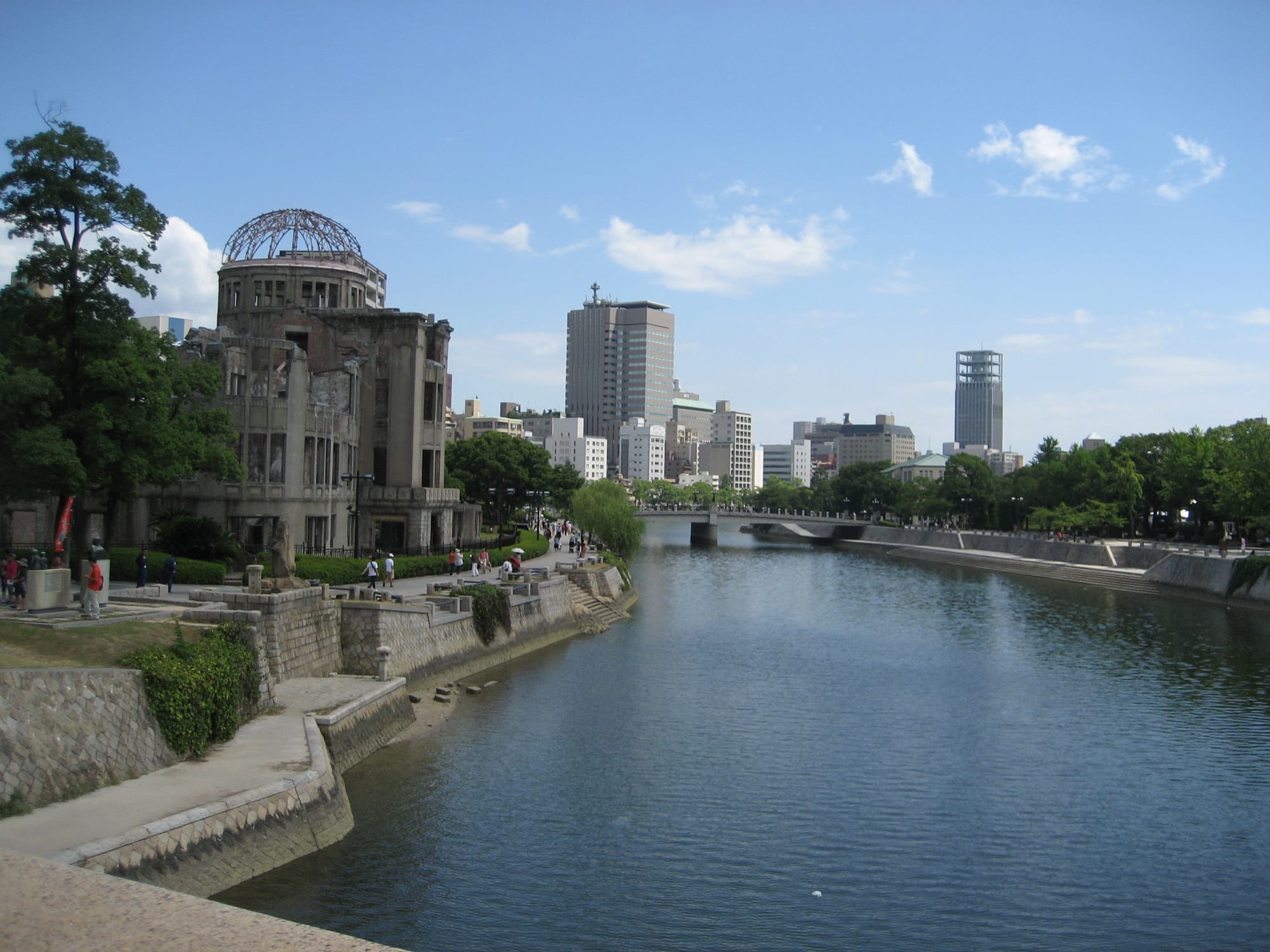
As I walked in the heat I could not help but look at the people, especially women and children, thinking to myself, sixty years ago it could have been them. Looking at elderly individuals I asked myself, "Are they survivors?" I would look at teenagers walking around without a care in the world and think, "Do they know what happened here? How can they be this nonchalant? We are in Hiroshima." Just the word: Hiroshima. To this day, when I see it in writing or hear it spoken, I cannot help but be brought back to that day.
"I kept thinking about being an American whose country did this and to this day, by and large, defends it."
It was two days before the anniversary of the atomic bombing. I kept thinking that sixty years ago on this day people had no idea what was going to happen. How many got up two days later, on that fateful morning, ate breakfast, got ready for school or work, kissed their loved ones goodbye only to never see them again?
And then it happened. Before I knew it, it was in front of me. I was face to face with the Genbaku Dome, commonly known as the "atomic bomb dome," one of the only structures still standing in its original form from the atomic bombing. I watched as tourists took pictures in front of it, smiling as if they were at Disney World. Did they understand what they were looking at? Where they were? I could not take my eyes off it. I kept thinking about being an American whose country did this and to this day, by and large, defends it. I could not help but think about where I was standing and what it looked like all those years ago. I could feel myself changing, a fire and passion building in me that had never existed. Why had I not cared about this before? Why did it take me this long?
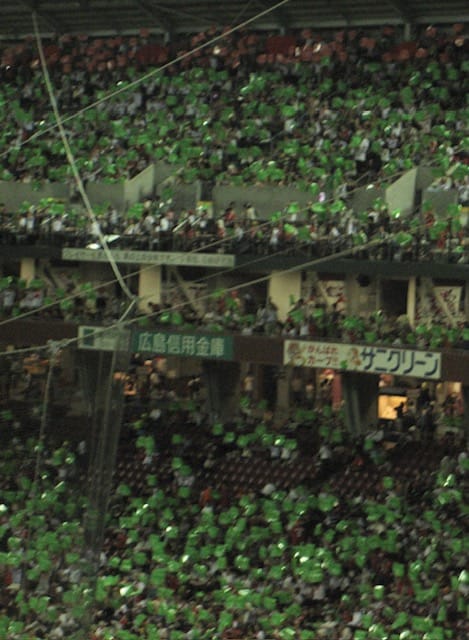
That night I took in a Hiroshima Carp baseball game. As I sat in a stadium filled with Japanese citizens smiling, cheering, eating, and laughing, I kept seeing dead faces. I kept looking at smiling children who were intrigued by the American and waving to me and thinking that sixty years ago it was children who looked like them that we did this to. I kept thinking about the stadium and how many people were in it compared to those who died in the atomic bombing. I could feel my emotions begin to rise. The anger. The guilt. The sadness. The shame. Then came the seventh inning stretch. In the United States, this would be a time to grab a snack, use the bathroom, and "stretch" your legs, hence the phrase. Depending on the ball park, the crowd in unison may sing a signature song like "Take Me Out to the Ball Game." But at this game the whole crowd held up a green poster commemorating the atomic bombing with a message of peace. And the song? Of course…John Lennon's "Imagine." I could feel my eyes welling up. My emotions about to boil over. But somehow I managed to keep it all in, for better or worse. I marveled at how much a message of peace was everywhere I turned.
August 6. I awoke at 6AM to prepare for the day ahead. But no amount of preparation would be enough. As I sat under the tent at the commemorative ceremony, I kept checking my watch waiting for 8:15AM. I noticed that I unconsciously kept looking up at the sky. Then the moment of silence and the church bells began to ring. I was shook. I kept telling myself to keep it together. Do not break. As the ceremony concluded, I wandered around the Peace Park almost as if in a fog. I could not wrap my head around what it must have been like at this very moment sixty years ago. Everywhere I turned there seemed to be another Japanese citizen offering me a bottle of water, greeting me with a peace sign, and handing me some sort of literature about eliminating nuclear weapons. I looked at tourists, especially from America and thinking, "you just don't get it." This was not a vacation or something to check off your bucket list, to mourn for a few minutes, reflect and grab some sushi. The feeling that I would never be the same after this trip began to slowly set in. How others could return home and just carry on with their lives as if nothing had changed was incomprehensible.
The night of August 6 I walked to the Motoyasu River. Thousands of people were already there. Solemn music was playing. Media crews were scattered about. This river is also next to what is referred to as the "T-Bridge," for its shape from above. This was an easy landmark for the pilots who dropped the Bomb. When the Bomb was dropped, many of those who were fighting for survival, horribly injured, dove into the river. As the river filled with the dead and dying, the tide shifted and in came the salt water. Even now as I write this, I cannot imagine the physical pain that must have caused for all those in the water.
"I will dedicate my life to making sure this never happens again."
To honor those lives lost, there is a lantern ceremony, where one can make their own floating lantern and put it in the water. I was in line with my new Japanese friends. As a student I was part of a partnership with Ritsumeikan University in Kyoto. I had spent over a week with my counterparts from Japan and we quickly bonded over everything from music, history, food, and sports. However, we were constantly aware, even if we did not speak about it out loud, what we were experiencing together.
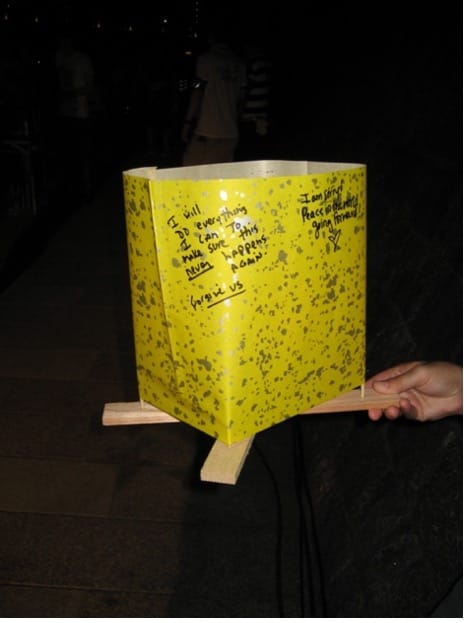
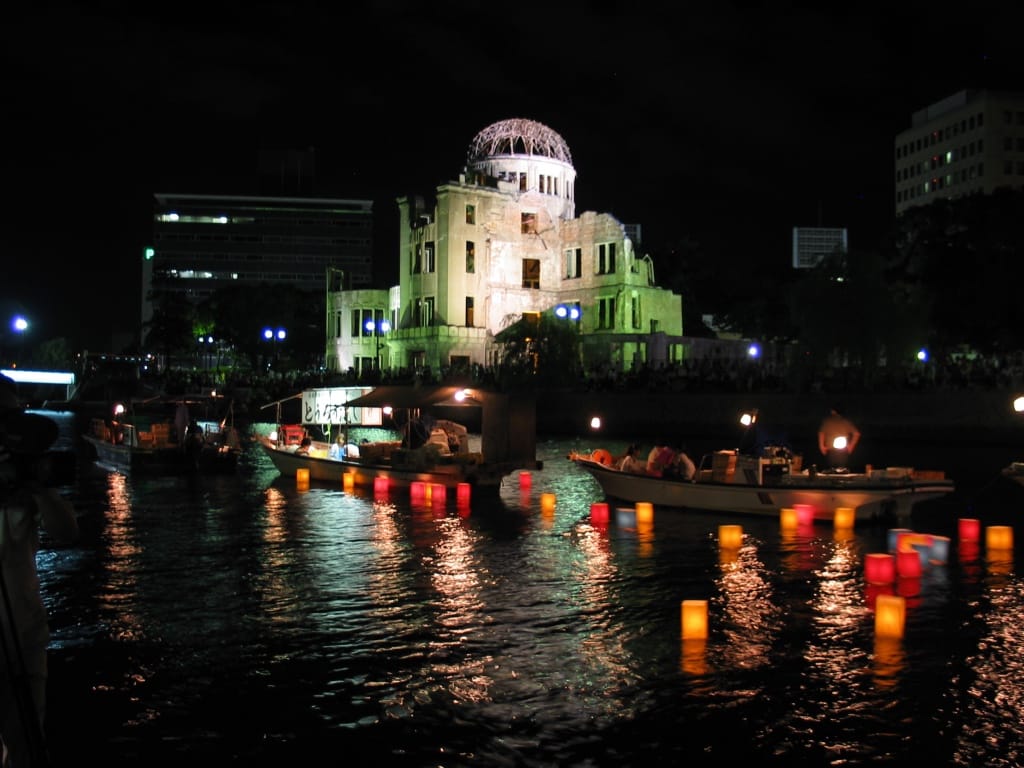
We prepared our lantern. I wrote on it, "I will dedicate my life to making sure this never happens again." I entered the water holding hands with Mai and Shige. We watched it float away together. This was the moment. All the emotions I was feeling up till now boiled over. I could not bury it. I sobbed. I asked for forgiveness. I promised to always fight till every last one of these weapons was wiped off the earth. As we embraced, all crying, I felt a tug at my shoulder. It was Koko Tanimoto Kondo, one of the youngest survivors of the atomic bombing. We had grown close over the trip. She hugged me and said, "These students will never forget this moment. Neither should you. But now it is on you to reach people one at a time to make sure this never happens again." From that moment, the sorrow turned to passion. A fire was lit inside me. I would never be the same.
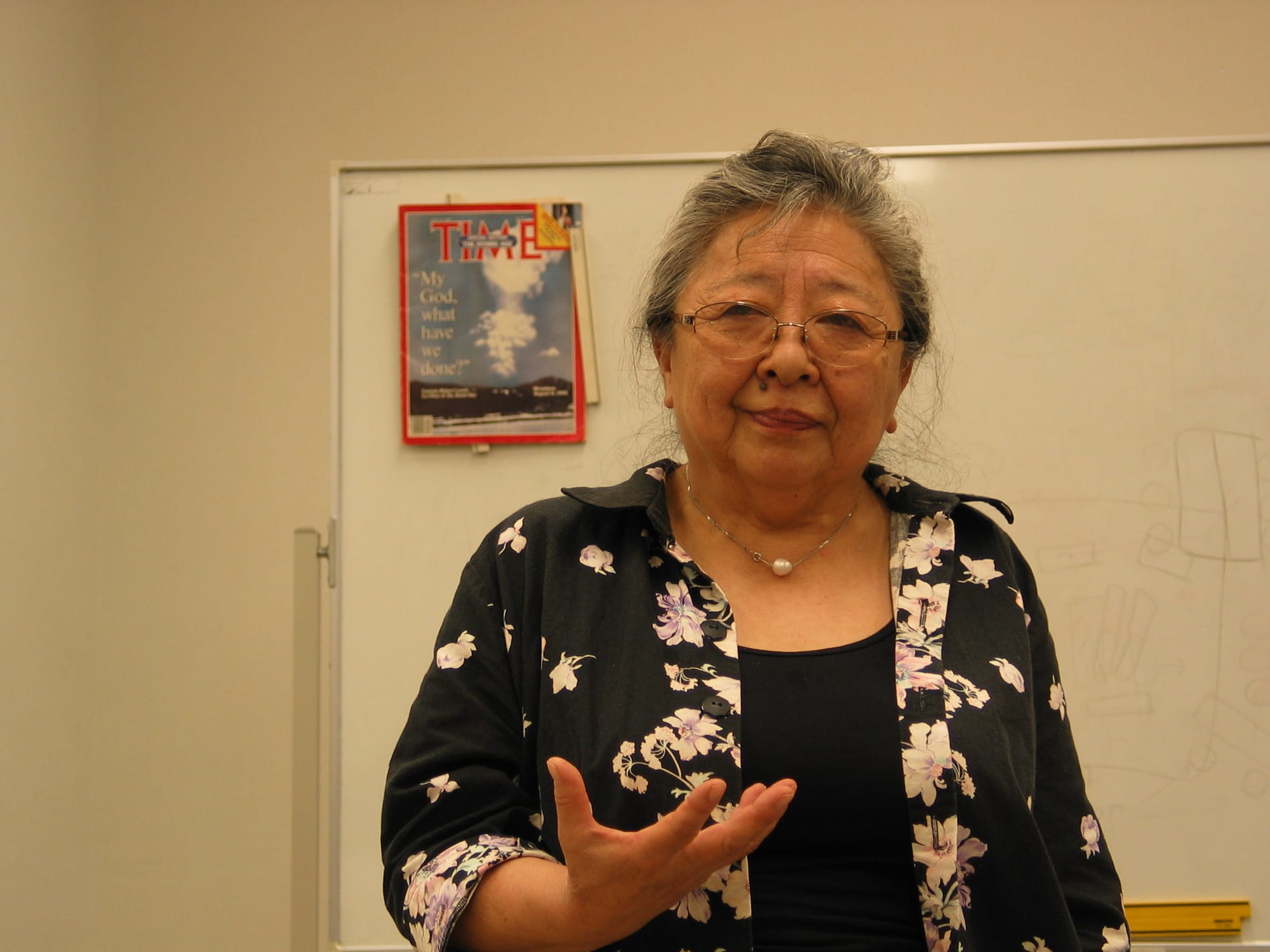
When one decides to dedicate their life to this cause, it can easily turn into a lifelong struggle. Reading and writing about nuclear war all day, every day is not great for the soul. There is seldom a victory. It is a marathon, not a sprint. While the fire that ignited on August 6, 2005 has burned in me for over twenty years it has at times gone down to a flicker. But it has never been completely extinguished. I know when I die nuclear weapons will still be on this planet. But here we are in the 80th year. So many of the atomic bomb survivors I have known and befriended have died. But I made a promise to them, especially Koko, that I would never stop fighting to eliminate nuclear weapons. So how can I stop now? If I wanted prestige, money, or job security, I would not have chosen this path. But I believe this path chose me. I am not sure I had a choice.
Help Nuclear Times be the magazine for nuclear disarmament.
The moment I decided to travel to Hiroshima my life was forever changed. For the better? I am not sure. How many sleepless nights have I had because I felt that I was not doing enough, worried about who had control of our nuclear arsenal, frustrated that not everyone saw the issue as I did. But then I think that anything I am going through cannot possibly compare to what survivors have dealt with. "Get up and make sure you do everything you can in the next 24 hours to make sure Hiroshima never happens again," I tell myself each morning.
"This 80th anniversary, I will do what I do every year and indeed every day. Honor those who died and survived, and do all I can to achieve nuclear disarmament."
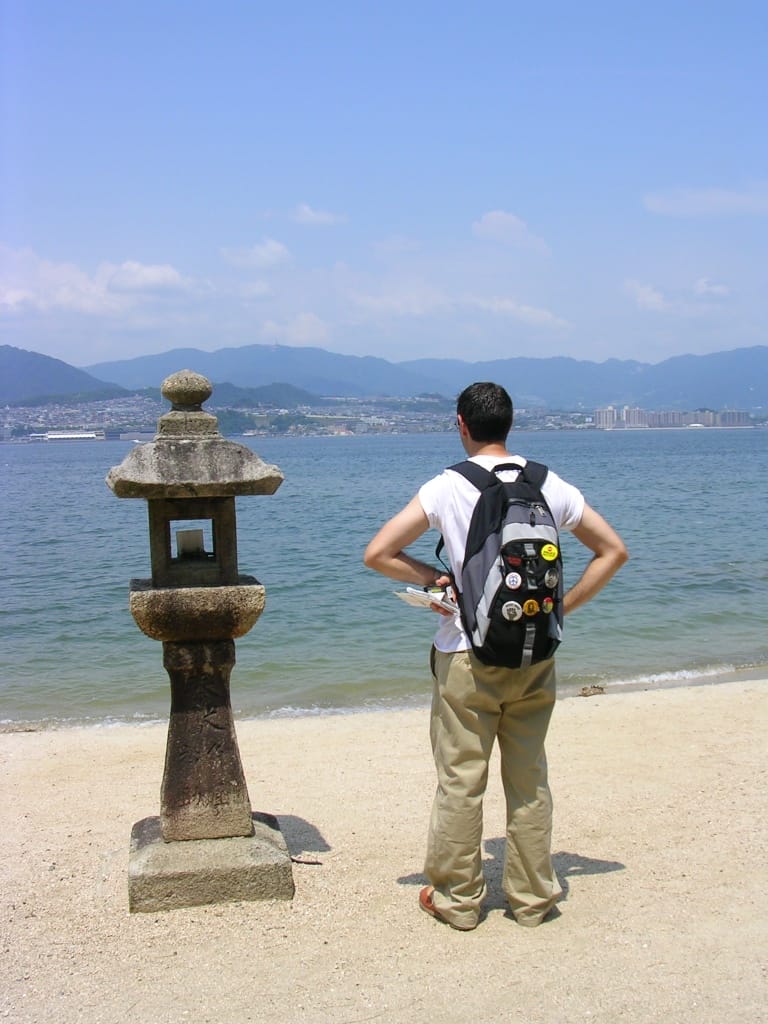
I wish I could say that I find solace in every person that tells me I changed their way of thinking or inspired them to take up the cause. But more often than not, I dwell on the one student who left my class still believing that using nuclear weapons and killing hundreds of thousands of civilians was somehow justified. I think about why I could not reach the neighborhood teen who came to me smiling ear to ear because he killed so many people in a video game he got a nuclear bomb as a prize. I continue to live my life thinking I have not done enough. But this flame in me continues to burn. I know I will never be able to stop trying to inspire, motivate, and educate anyone I come in contact with. I know I will never stop reading and writing about this issue. I also know I will continue to live in a world where in twenty minutes it can all end and so many simply do not care. But I am also made aware daily that I am not alone. I have seen, met, and mentored so many who have also made the decision to go down the same path as me. I have managed to find inspiration in the many who came before me.
So, this 80th anniversary, I will do what I do every year and indeed every day. Honor those who died and survived, and do all I can to achieve nuclear disarmament in hopes that one day I will be able to tell students that there was once a time when nuclear weapons roamed the earth, but that is all in the past.



